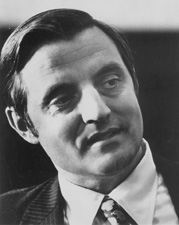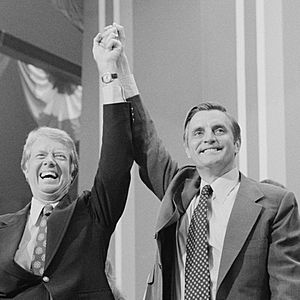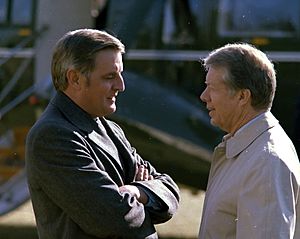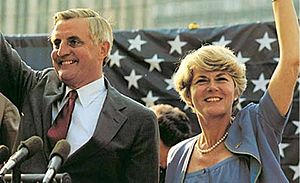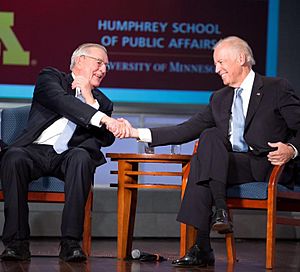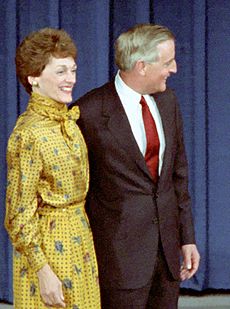Walter Mondale facts for kids
Quick facts for kids
Walter Mondale
|
|
|---|---|
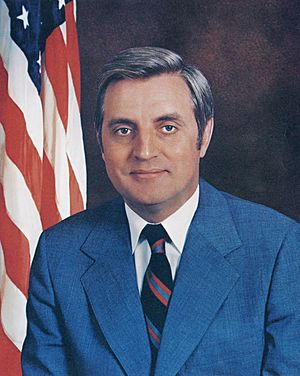
Official portrait, 1977
|
|
| 42nd Vice President of the United States | |
| In office January 20, 1977 – January 20, 1981 |
|
| President | Jimmy Carter |
| Preceded by | Nelson Rockefeller |
| Succeeded by | George H. W. Bush |
| 24th United States Ambassador to Japan | |
| In office September 21, 1993 – December 15, 1996 |
|
| Nominated by | Bill Clinton |
| Preceded by | Michael Armacost |
| Succeeded by | Tom Foley |
| United States Senator from Minnesota |
|
| In office December 30, 1964 – December 30, 1976 |
|
| Preceded by | Hubert Humphrey |
| Succeeded by | Wendell Anderson |
| 23rd Attorney General of Minnesota | |
| In office May 4, 1960 – December 30, 1964 |
|
| Governor |
|
| Preceded by | Miles Lord |
| Succeeded by | Robert Mattson |
| Personal details | |
| Born |
Walter Frederick Mondale
January 5, 1928 Ceylon, Minnesota, U.S. |
| Died | April 19, 2021 (aged 93) Minneapolis, Minnesota, U.S. |
| Political party | Democratic |
| Spouse | |
| Children |
|
| Education |
|
| Signature | |
| Military service | |
| Branch/service | United States Army |
| Years of service | 1951–1953 |
| Rank | Corporal |
| Unit | 3rd Armored Division Artillery |
Walter Frederick "Fritz" Mondale (born January 5, 1928 – died April 19, 2021) was an American lawyer and politician. He served as the 42nd Vice President of the United States from 1977 to 1981. He worked alongside President Jimmy Carter.
Before becoming Vice President, Mondale was a U.S. Senator for Minnesota from 1964 to 1976. In 1984, he ran for president as the Democratic Party's candidate. However, he lost to President Ronald Reagan in a very big election loss. His running mate, Geraldine Ferraro, made history as the first woman from a major party to be nominated for Vice President.
Mondale was born in Ceylon, Minnesota. He studied at the University of Minnesota and then served in the U.S. Army during the Korean War. After the war, he became a lawyer. He married Joan Adams in 1955. He was appointed Minnesota Attorney General in 1960 and later elected to the U.S. Senate. As a Senator, he supported laws to protect consumers, ensure fair housing, and help schools become desegregated.
Contents
Early Life and Education
Walter Frederick Mondale was born on January 5, 1928, in Ceylon, Minnesota. His father, Theodore, was a Methodist minister, and his mother, Claribel, was a music teacher. His family called him "Fritz," a common nickname for Frederick.
Mondale grew up during the Great Depression, a time when many families were poor. His family moved several times. His father's strong religious beliefs, including support for civil rights, greatly influenced young Walter.
After high school, Mondale attended Macalester College for two years. He then transferred to the University of Minnesota, where he earned a degree in political science in 1951.
Military Service and Law School
Since he couldn't afford law school right away, Mondale joined the United States Army in 1951. He served during the Korean War and was discharged in 1953 as a corporal.
With help from the G.I. Bill, Mondale then went to the University of Minnesota Law School. He graduated in 1956. In 1955, he married Joan Adams. After law school, he worked as a lawyer in Minneapolis before entering politics.
Starting His Political Career
Mondale became active in politics in the 1940s. At just 20 years old, he helped organize Hubert Humphrey's successful campaign for the U.S. Senate in 1948. Mondale did very well in his assigned area, which was usually a Republican stronghold.
He later worked on several campaigns for Orville Freeman, who became the Governor of Minnesota.
Minnesota Attorney General
In 1960, Governor Freeman appointed Mondale as the Attorney General of Minnesota. Mondale was only 32 years old at the time. He was then elected to the position in 1962.
As Attorney General, Mondale supported the idea that people accused of crimes should have a lawyer. He helped organize a group of state attorneys general to argue this point to the U.S. Supreme Court. This was important for the case Gideon v. Wainwright, which made sure everyone had the right to a lawyer.
Serving as a U.S. Senator
On December 30, 1964, Minnesota Governor Karl Rolvaag appointed Mondale to the United States Senate. He filled the spot left by Hubert Humphrey, who had become Vice President. Mondale was then elected to the Senate on his own in 1966 and reelected in 1972.
He served in the Senate until 1976, when he resigned to become Vice President.
Key Policies and Focus Areas
As a Senator, Mondale worked to find common ground on economic and social issues. He focused on keeping the Democratic Party strong. He became known for his support of civil rights.
Mondale was a main supporter of the Civil Rights Act of 1968, also known as the Fair Housing Act. This law made it illegal to discriminate against people when they were trying to buy or rent a home.
He also started to oppose the Vietnam War after Richard Nixon became president in 1969. Mondale helped create laws to limit the president's power to continue the war.
Committee Work
Mondale served on many important Senate committees. These included committees dealing with finance, labor, education, and housing. He also led a special committee focused on equal education opportunities.
In 1975, Mondale was part of the Church Committee. This committee investigated claims of wrongdoing by U.S. intelligence agencies like the Central Intelligence Agency (CIA) and the Federal Bureau of Investigation (FBI).
Apollo 1 Accident Investigation
In 1967, Mondale was on the Aeronautical and Space Sciences Committee. This committee looked into the tragic fire that killed astronauts Gus Grissom, Ed White, and Roger Chaffee during a test of the Apollo 1 spacecraft.
Mondale questioned NASA officials closely during the investigation. He pushed for more openness about problems within the space program. He believed that by making these concerns public, NASA was forced to make important changes to improve safety.
Vice Presidency (1977–1981)
In 1976, Jimmy Carter, the Democratic presidential candidate, chose Mondale as his running mate. The Carter-Mondale team won the election on November 2, 1976. Mondale became Vice President on January 20, 1977. He was the first Vice President to live at Number One Observatory Circle.
As Vice President, Mondale traveled a lot, both in the U.S. and around the world. He promoted the administration's foreign policy goals. He also became the first Vice President to have an office in the White House.
Mondale changed the role of the Vice President. He made it more active, turning it into a full partnership with the president. He started the tradition of weekly lunches with the president, which continues today. This helped future Vice Presidents have a more important role as advisors and problem-solvers.
1980 Election
Carter and Mondale ran for reelection in 1980. However, they lost to the Republican team of Ronald Reagan and George H. W. Bush.
Life After the Vice Presidency
1984 Presidential Campaign
After leaving office in 1981, Mondale decided to run for president in 1984. He became the leading candidate for the Democratic Party.
At the 1984 Democratic National Convention, Mondale made a historic choice. He picked U.S. Representative Geraldine Ferraro from New York as his running mate. She was the first woman ever nominated for Vice President by a major political party.
During his acceptance speech, Mondale famously told voters he would raise taxes to reduce the national debt. He wanted to be honest, but this statement was not popular with many voters.
Mondale lost the election to President Reagan in a landslide. He won only his home state of Minnesota and the District of Columbia. This was one of the biggest election losses in U.S. history for a major party candidate.
Ambassador to Japan and Later Career
After his presidential campaign, Mondale returned to working as a lawyer. From 1993 to 1996, President Bill Clinton appointed him as the United States Ambassador to Japan.
Mondale also taught part-time at the University of Minnesota. He remained active in the Democratic Party.
2002 Senate Election
In 2002, a tragic event brought Mondale back into politics. Senator Paul Wellstone of Minnesota, who was running for reelection, died in a plane crash just days before the election. Mondale agreed to replace Wellstone on the ballot.
Mondale ran against Norm Coleman, the mayor of St. Paul. Mondale lost the election by a small number of votes. After the loss, he said, "At the end of what will be my last campaign, I want to say to Minnesota, you always treated me well, you always listened to me."
He continued to be involved in public life, supporting other politicians and working on various projects.
Family and Personal Life
Mondale's wife, Joan Mondale, was a strong supporter of the arts. She passed away in 2014.
The Mondales had three children: Ted, Eleanor, and William. Their daughter, Eleanor, was a television and radio personality who sadly died of brain cancer in 2011. Their son, Ted, was a Minnesota state senator.
Mondale enjoyed fishing, reading, playing tennis, and watching Monty Python. He was a Presbyterian.
The University of Minnesota Law School renamed its building "Walter F. Mondale Hall" in his honor in 2002. Mondale also had strong ties to Norway, his family's ancestral home.
Death
Walter Mondale passed away peacefully in his sleep at his home in Minneapolis, Minnesota, on April 19, 2021, at the age of 93. Before his death, he spoke with many important figures, including Jimmy Carter, Bill Clinton, and Joe Biden.
President Carter called Mondale "the best vice president in our country's history." President Biden described him as a "dear friend and mentor" who helped define the role of the Vice President.
A memorial service for Mondale was held on May 1, 2022, at the University of Minnesota. President Joe Biden was among those who attended to honor him.
Images for kids
See Also
In Spanish: Walter Mondale para niños
 | Chris Smalls |
 | Fred Hampton |
 | Ralph Abernathy |


